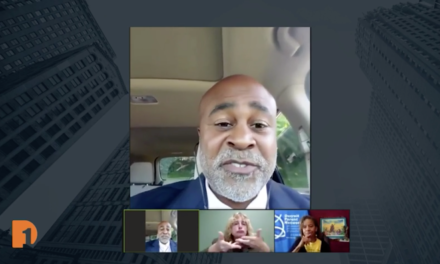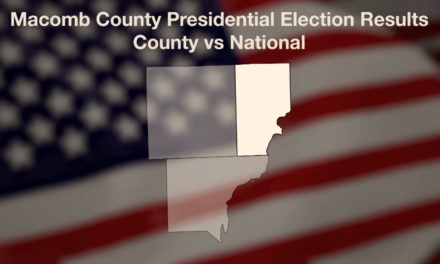Governor Whitmer recently ordered that the Line 5 Pipeline shut down, moving to revoke the 1953 easement that allowed for the operation of the dual pipelines under the Straits of Mackinac. It’s the latest development in an ongoing battle between the state and Enbridge, who operates the line. Great Lakes Now Program Director, Sandra Svoboda, talks with environmental law expert, Nick Schroeck, about what this could mean for the future of Line 5.
Read full transcript
Sandra Svoboda Nick, we’ve seen so many things happen with Enbridge Line 5, how is this new action different?
Nick Schroeck, Environmental Law Professor, U-D Mercy Well, it’s different because this is specifically related to the easement, the easement that the state initially granted back in 1953 for the pipeline. And the state as in charge of our Great Lakes bottom lands and the protector of our Great Lakes Bottom lands has authority over that submerged ground under the straits of Mackinac. And so, this is a question over whether or not Enbridge has been operating this pipeline legally in accordance with that easement. This is a fundamental issue about the ability of this pipeline to continue its operation there along the straits of Mackinac.
Sandra Svoboda Is this a different kind of legal authority that the governor and the attorney general are invoking to try to have this shut down in six months?
Nick Schroeck, Environmental Law Professor, U-D Mercy Yes. So, what’s at issue here is something called the public trust doctrine. And the public trust recognizes that you and I and any residents in Michigan as well as future generations have an interest in being able to fish, to hunt, to use the Great Lakes for transportation and navigation purposes. And so, what the states invoking here when looking at this easement with Enbridge is whether the public trust doctrine was considered back in 1953 when the original easement was granted. The Michigan Department of Natural Resources and the governor are contending that public trust considerations were not made and in fact, the easement should not have been granted back then in 1953. The states also alleging that the ongoing operation of this pipeline puts our public trust resources, puts the Great Lakes at risk, and the state is arguing that’s an unacceptable risk and therefore this easement should be terminated.
Sandra Svoboda Well, let’s talk about that risk for a moment? Remind us what’s in the pipeline and how it’s affecting people in their everyday lives in Michigan and beyond?
Nick Schroeck, Environmental Law Professor, U-D Mercy So primarily it’s oil and this is oil that’s coming in from Canada. Traversing from Canada through Wisconsin, through the Upper Peninsula and through the straits, down through lower Michigan and over to Sarnia, Ontario.
Sandra Svoboda Who else is in favor of the pipeline? We’ve certainly heard from environmental groups that are hailing this new order to have it shut down in six months. But who’s benefiting from it? What are the economics and the benefits to other groups, Nick?
Nick Schroeck, Environmental Law Professor, U-D Mercy Well, I mean, I mentioned the petroleum products that are actually diverted for heating the liquid petroleum in the upper peninsula. So certain people in the UP think that’s a major concern. But otherwise, the vast majority of this crude oil makes its way to Canada to be refined and turned into gasoline and other oil-based products. So primarily the use of this pipeline is really just to go through Michigan.
Sandra Svoboda So we did reach out to Enbridge to have someone interviewed on this program. We did not hear back in time before this taping, but we do have a statement. It’ll will be available on the website, but I’ll read a bit in part, Enbridge said, “We will continue to focus on the safe operation of the dual line five pipelines at the Straits of Mackinac, ensuring the Great Lakes are protected while also reliably delivering the energy that helps to fuel Michigan’s and the region’s economy.” What can happen between now and May? I mean, that’s 6 months away, what should we look for maybe in a legal fight or otherwise with this new order and Enbridge?
Nick Schroeck, Environmental Law Professor, U-D Mercy So the same day that the Governor announced the termination of this easement, the Attorney General Dana Nessel also filed a lawsuit in Ingham County Circuit Court. Seeking what’s called a declaratory judgment. That’s legal speak, saying that the court would actually agree with the state’s interpretation and agree that this easement should be revoked or otherwise terminated. I imagine Enbridge may also try and raise some other legal claims. They may argue that they basically have a license to use this pipeline and they may try and challenge the state’s action.
Sandra Svoboda And is any of this impacting the plan to build a tunnel under the straits to replace this aging pipeline?
Nick Schroeck, Environmental Law Professor, U-D Mercy Yes, that’s really interesting. So, you have ongoing permitting processes in place related to the tunnel, which would house potentially a new pipeline going through the straits of Mackinac. However, if the pipeline is shut down, one of the arguments to have the tunnel is Enbridge needs it as a necessity to continue to transport oil through the Straits of Mackinac. Well, if you don’t have that pipeline in existence, are you still able to make that argument as persuasively that you need a tunnel? But, as far as we know right now, Michigan Environment, Great Lakes and Energy Department, as well as the United States Army Corps of Engineers, that also has jurisdiction over Great Lakes bottom lands, they continue working forward through the permitting process as if a tunnel will be built in the future.








